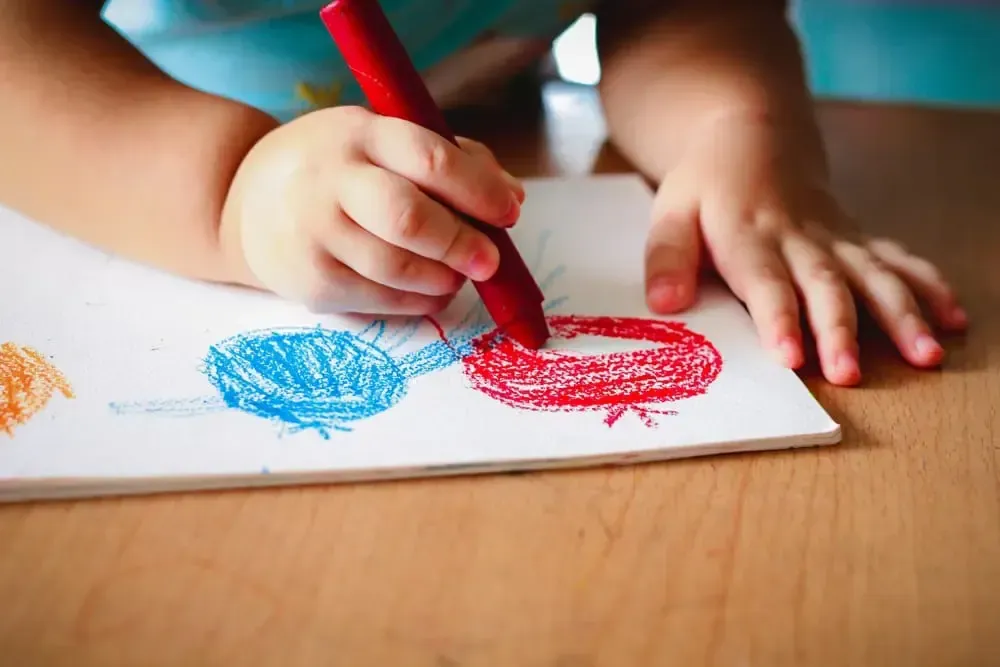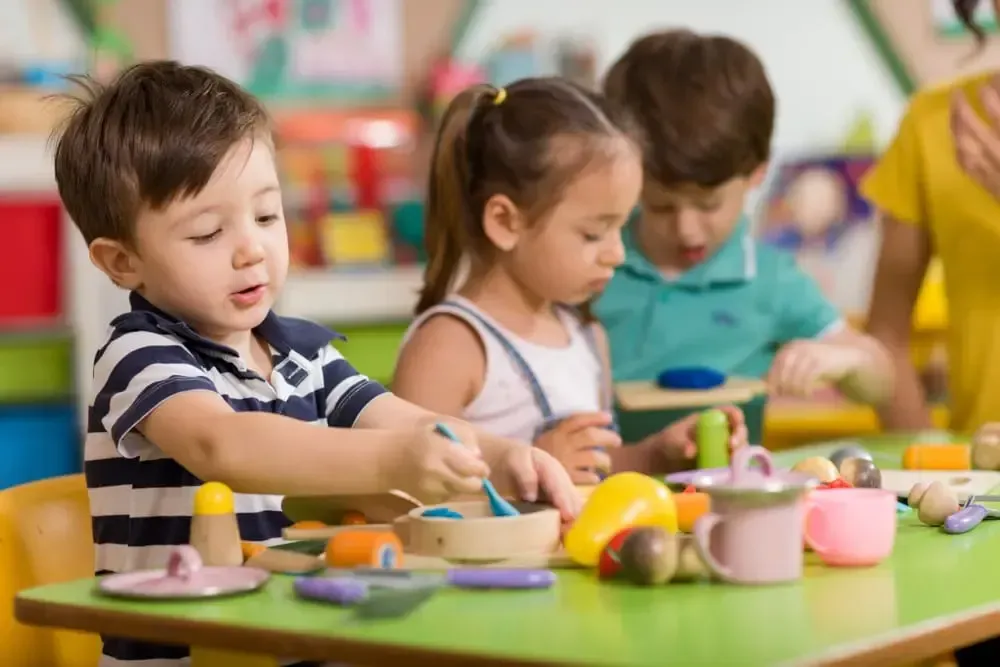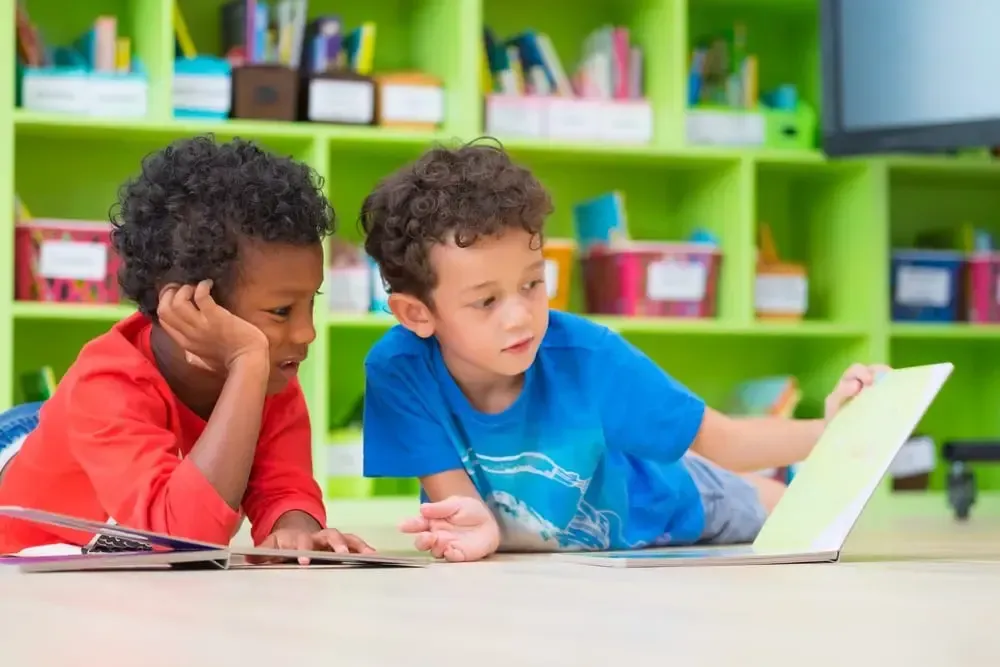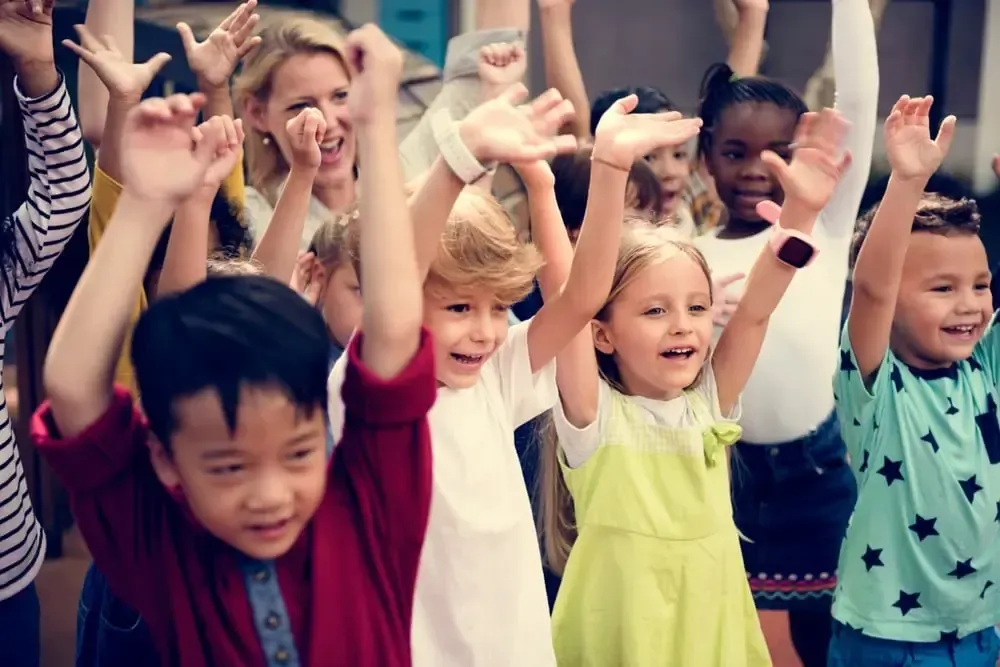News & Advice
Parenting is hard, and at Kindoo, we’re here to make it easier. Our team of dedicated, knowledgeable professionals provides the latest updates, expert tips, and valuable insights on early childhood education and care.

Finally, a childcare and early education service that provides what parents need most… affordability, flexibility, transport, safety, superior education, easy bookings and great staff. Affordability We’ve passed on the savings we’ve made in the administration of our business and the tailoring of our staff to enrolments, to provide you with more affordable care. When combined with the ability to book sessions rather than whole days, this makes us much more affordable than long day care, nannies and babysitting services. As a Government Approved and Accredited child care and early education service, we also help you reduce your out of pocket expenses further through the Child Care Subsidy. Flexibility At Kindoo! you can better match the care and education you need to your daily schedule. This allows you to pay for care when you need it rather than whole days. We run five sessions of care and education each day starting from 7am right through to 11.30pm including: Before Care (7.00am to 8.30am Monday to Friday) Core Care / kindergarten (8.30am to 1.30pm Monday to Friday) Extension (1.30pm to 4.00pm Monday to Friday) After Care (4.00pm to 6.30pm Monday to Friday) Evening Care (6.30pm to 11.30pm Monday to Saturday) Bookings are easily made online and can be Permanent (same time, same day, each week) Casual (as and when you need it) Emergency (when you need care in a hurry) Simply book those sessions that match your needs. Let’s use Catherine’s example. Catherine works each Wednesday and Thursday from 9am to 5pm so she would make a Permanent booking for the Core Care, Extension and After Care Sessions for her 2yo daughter Mia. On Friday’s, however, Catherine, who works in hospitality, is required work from 2pm until 10pm. Her Permanent booking would be for the Extension, After Care and Evening Care sessions. She knows that she needs to get to the dentist next Monday at 3.00pm for a check up too. Catherine books the Extension session from 1.30pm to 4pm on a Casual basis. Given a backlog in patients and a smash on the freeway though, Catherine knows she won’t be able to pick up Mia before 5pm. She calls the customer Service Team at Kindoo! and books an Emergency After Care session for Mia. Care sorted. No stress! The beauty of this service too is that it is open to all children between the ages of 6 weeks and 12 years with before and after school care and our full day, Camp Kindoo! Holiday Program also availaable during term breaks. Transport Safe, free pick-up and drop-off transport is available to children enrolled in our Before School Care and After School Care programs. We service three local Primary Schools all within a 5min drive of our centrally located Ferntree Gully Campus. Superior education Our carefully formulated learning and educational programs draw on the latest research and are specifically designed for all children attending Kindoo! regardless of age. Even from the youngest ages, we are able to provide programmed education to meet the developmental needs of children- whether this for babies learning to crawl and hold cutlery, to two year olds learning to speak and right through to later kindergarten aged children entering into primary school. Our programs follow the Early Years Learning and Development Framework (EYLDF). For example, within our Kindergarten Room, specially designed spaces are used not only for learning basic reading, writing and counting but also for the development of social skills, science, technology, engineering and maths (STEM), self care in the form of fitness and health, nature and creativity. Within our Babies and Toddlers Rooms, activities such as sensory play and dramatic play are offered to assist their development. Safety and security At Kindoo! you can have comfort that your child is being cared taught by staff that care about their welfare, have stringent processes and facilities in place to keep them safe and are passionate about their learning. We have strict safety protocols in place not only for each child’s physical safety but also to ensure that the highest hygiene standards are in place to protect against infections. Time Saving Technology All bookings can be made online using our Parent App at any time of the day or night. We also provide tablet based Attendance Recording to make your the Sign In/ Sign Out process as quick and easy as possible. Great Staff Only enthusiastic, welcoming staff that are fully qualified, trained in the latest skills for early learning and have a genuine interest in the development of your child are employed at Kindoo! To find out more simply call us on 03 8595 7939 to arrange a visit of our central campus in Ferntree Gully.

Importance Of Developing Social Skills For Children. Developing social skills in children prepares them for a lifetime of healthier interactions in all aspects of life. Social skills are an integral part of functioning in society. Displaying good manners, communicating effectively with others, being considerate of the feelings of others and expressing personal needs are all important components of solid social skills. Helping children to develop these important skills requires a different set of strategies in each stage of development. It seems some children, like many adults, are more naturally socially adept than others. These are the kind of people others gravitate to and for whom making friends comes easily. Like any other skill, social skills can be learned. What is important, however, is that children are able to form meaningful bonds with others, can empathize and interact with others appropriately, and have the skills to adapt in uncomfortable situations. One can start by instilling social skills in their infants when they are very young. Babies are unable to tell you what they want directly. This means you will need to pay attention to the actions and non-verbal cues that your baby gives. When you know what your baby needs, give it to them. If that doesn’t work then you may have misinterpreted their needs, and you should try something else. Adults sometimes make the mistake of assuming children play just to pass the time. This is not true. In fact, children gain most of their skills through playing. This is how they explore the world around them, and it should be encouraged for them to learn new skills while playing. While your baby is exploring their world through play, they will learn new skills. It is up to you as a parent to reinforce those skills by giving your baby positive feedback. This makes your baby feel confident and secure in their development. As they grow older, it is important to discuss feelings with your toddler, so they are able to understand and interpret feelings, of others and their own. Through your discussion of how they feel, they begin to learn words associated with those feelings and can later use those words to talk out their feelings. This will help them transition to talking about feelings instead of acting out their frustrations. In general, children will have developed certain social skills and social cues by these ages: 2- to 3-year-olds: able to seek attention from others, initiate social contact with others both verbally (saying “Hi” and “Bye”) and physically, look at a person who’s talking, have the ability to take turns talking, and laugh at silly objects and events. 3- to 4-year-olds: are able to take turns when playing games, play with a doll or stuffed animal, and initiate verbal communication with actual words. 4- to 5-year-olds: are able to show more cooperation with children, use direct requests (like “Stop”), are more prone to chatting, and pretend play. 5- to 6-year-olds: are able to please their friends, say “I’m sorry,” “Please,” and “Thank you,” are more strategic in bargaining, play competitive games, and understand fair play and good sportsmanship. Playdates are a crucial part of growing up. Having a playdate is a great way to introduce your child to the concept of using rules when a friend comes over and to teach him how to be polite to guests. You can go over all the different things the children can do together, and then have your child offer his guest three activities to pick from. You can have them take turns picking activities. This will help avoid disagreements and teach them about compromising. The following strategies can help enhance your child’s social development further: Teach empathy: Run through different scenarios by asking your child how other people might feel when certain things happen, and substitute different situations each time. Explain personal space: Tell your child that it is important for everyone to have some personal space to feel comfortable, and practice acceptable ways to interact with someone during playtime. Practice social overtures: Teach kids the proper way to start a conversation, get someone’s attention, or join a group of children who are already playing together. These are all situations that can be discussed and brainstormed at the dinner table, or in the car on the way to school or activities. Go over taking turns: Sit with your child for at least an hour a day and play with him to explain what it means to wait, take turns, and share. In order to build gratifying human relationships, it is vital that children learn and have the opportunity to practice the social skills considered appropriate by society. It is important to teach children to conduct themselves in ways that allow them to develop relationships with other people. As most children grow older, they interact more and more with people in situations where direct supervision by parents is not possible. Drawing from what they have learned at home and kindergarten about socializing, children make friends within their peer group and soon learn more about socializing, hopefully refining their social skills as they grow and mature. These friendships are important for all children to develop. Friends serve central functions for children that parents do not, and they play a crucial role in shaping children’s social skills and their sense of identity. (In Parenting by Educational Playcare August 11, 2016 ). Don’t forget, Kindoo! is all about Family Flexible Care and can assist with both casual, emergency and permanent sessional or full day bookings five days per week from 7am to 6:30pm. Simply call 03 8595 7939 to see how we can help.ee how we can help.

Why are temper tantrums so difficult for parents to handle? Besides the fact that they’re loud, annoying and embarrassing, we often feel it’s our job requirement to make our kids act the way we feel they should behave. If we can’t do that, we feel ineffective. We also don’t like the judgments that we imagine others are making of us when our kids are out of control. We don’t know what to do, but feel we must do something—after all, we are the parents. And of course, on a deep level we want our kids to learn how to calm down and act “normally.” When they’re not able to do that because they haven’t yet figured out how to manage their own frustrations, it can sometimes cause us to have our own tantrums, which only adds more fuel to the fire. And when we feel a sense of helplessness, we often react by getting angry or giving in—and then we feel controlled by our kids’ behavior. But attempting to manage our anxiety by trying to control their responses never works. I think it’s better to focus on dealing with our own feelings of helplessness, embarrassment and frustration when our kids are having a meltdown. Remember, you’re just trying to be the anchor in the storm that’s calming the system down. If one person in a system can stay relatively calm, that is the best way you can quiet any kind of upset or tantrum. Sometimes parents ask me if there are ways to stop child temper tantrums from happening. I don’t really think there are—I think it’s natural to have tantrums. We adults have them all the time. We can lose our temper when someone cuts us off in traffic or when our kids don’t listen. Maturing is all about managing our emotions more effectively, and it’s a lifetime project. In my opinion, we can’t prevent tantrums, but we can impact how often and how long they go on by the way we respond to our children’s outbursts. I think when our children feel that we need them to behave “our way” in order for us to feel calm, it’s a natural reaction for them to become defensive. You’ll see an attitude of, “Oh yeah? Nobody can tell me what to do.” Ultimately, they will just shout louder and create more of a scene. We feel uneasy when we see our kids struggle, or be upset or uncomfortable, and this compounds the situation. As a result, we try to manage the anxiety that this provokes in us. When we yell or give in, we’re relieving our own distress rather than helping our children develop self control. When Your Child Has a Tantrum in Public When your child has a temper tantrum in front of others, there’s an extra element of embarrassment and shame that we feel as parents. I understand how that happens—it’s natural to react that way. We often think that being a good parent means having well–behaved kids all the time, so we imagine others are judging us by that standard. But as Total Transformation creator James Lehman says, “You are not a mind reader. If you try to imagine what others are thinking, 95 percent of the time you’re going to read something negative there. That’s because whenever we’re negative, we interpret other people’s perceptions of us as negative.” Look at it this way: the tantrum really isn’t about us, it’s about our child. While it’s easy to personalize your child’s tantrum and feel like it’s about you when it’s happening, trust me, it’s really about your child. Try asking yourself at those times, “What is most important, what others think of me, or what I think an effective parent would do right now?” If you’re in public or with others, you can simply explain that your child is having a hard time, excuse yourself and move out of the situation. Leave the room, go to the car, or go home. Do whatever you need to do quickly and matter–of–factly. Remember, you don’t want to give the tantrum attention, either positively or negatively. What to Do Before the Next Tantrum Hold on to your principles: In a relaxed moment, sit down and think about how you want to behave under the worst kind of stress. This is really key, because if you’re going to go by your “emotion of the moment,” you’ll often end up losing your cool. Consider how you want to react, and hold that picture in your mind. The next time your child acts out, do your best to remain true to that image of yourself. It may take some practice, but eventually you’ll be able to do it. Know what you can handle: Be realistic with your expectations. Know what you—and your kids—can handle. If you try to go on 15 errands instead of one, many young kids will not be able to deal with it. If your child is a little bit older, let him know what you expect; prepare him for what’s coming. You can say, “If you fall apart or start yelling for something, this is what’s going to happen.” Tell him what his consequence will be—and stick to it. If you are going to a store and your child tends to want everything in sight, provide him with a way to cope with his frustrations. For pre school kids, I think it’s helpful to bring a pad of paper and a pen and make a list of things they want. They can put things they see on their Christmas or birthday list. Smaller kids might draw pictures of what they’d like. I think it’s helpful to have a little tool box, so to speak, of things for your kids to do so that they can help themselves stay calm. Try to avoid your child’s “triggers” if you can: Try to avoid triggers that you know will set your child off. If your children are older, you can teach them to observe themselves. Do this by pointing out what you see happening. You can say, “I know when you come home from school or kinder and you’ve had a bad day, you tend to take it out on your little brother. What can you do instead of yelling at him and picking a fight?” Your child might say, “Well, I can spend some time playing in my room.” Your goal with your child here is to try some new things to avoid his triggers, and teach him how to see what sets him off in the process. Physical triggers are also very common. For younger children especially, make sure they’re getting proper rest and food and that they’re not over–extended. Plan ahead and give yourself a pep talk: If you know certain things trigger your child’s tantrums, plan ahead. Say to yourself, “We’re going to the supermarket, and I know what typically can happen there. So I’m going to warn my child and talk about what my expectations are ahead of time. If he has a tantrum, I’m going to stick to my guns.” Help coach him on ways to handle those triggers and let him know what you’ll do if he cannot manage his frustration. With younger kids, from toddler to the age of six, you may have to just physically pick them up and move them out of the store. Prepare yourself for that eventuality. Be a good role model: Be a good role model in terms of your own behavior. How do you feel when you’re frustrated about something? What you do with those feelings is something your child is going to learn. Decide how you will behave, no matter how your child behaves. Step away from your own emotions to figure out thoughtful responses to these difficult situations. Ask yourself this question: “How can I calm down when my child loses it?” instead of “How can I get my child to calm down?” No one can control how another person feels, period. And the more you try to manage your child’s reactions, the more he’ll probably act out. What to Do When Your Child Goes into Tantrum Mode Here are some rules of thumb I’ve found to be effective when you’re in the eye of the storm and your child has gone into tantrum mode. Get yourself to zero: The first order of business is to get yourself under control; get calm, rather than trying to get your child under control. Put the effort there. Take a walk around the house, count to 100, take your own timeout. Call a friend. Do whatever you can do to get yourself under control, but again, try not to lose your temper. Remember, you’re just trying to be the anchor in the storm that’s calming the system down. If one person in a system can stay relatively calm, that’s the best way to quiet any kind of upset or tantrum. Remember that you’re not responsible for getting your child under control: Remember, you are not responsible for the choices your child makes. Rather, you are responsible for how you choose to handle those choices. Try not to get engaged by your kids’ angry outbursts. If it doesn’t capture you, it won’t capture them. Stay focused on staying calm. Do not react by yelling, worrying, hovering or giving in—all typical things that we do as parents. Try not to lose it and have your own tantrum: This will only serve to escalate your child’s anger and frustration, and make him feel more defensive. Remember, anxiety is contagious, and so is calm. Do not give into your child’s request: If you give in to your child’s requests when he has an outburst, it will set up a pattern where you create more tantrums. In effect, you’ve taught your child that the best way to get what he wants is to scream, yell and be out of control. Isolate your child: I don’t mean to put your child into an isolation booth, but rather, put your younger child in his room or in some spot where he can have a timeout or cooling off period and learn how to soothe himself. Make sure you’re not continually engaging him in his tantrum. Fake it if you have to: There’s an old saying: “Fake it till you make it.” While you ultimately want to get calm, I think it’s okay to fake it until you get there. Of course you feel terrible inside: you’re embarrassed, upset and frustrated, but try saying to yourself, “I’m not going to react to these feelings because this will not solve my problem.” So in other words, you don’t have to be truly calm at first. You will have uncomfortable feelings, but it’s what you do with those feelings that matters. (And in the end, that’s the same thing we’re trying to teach our kids). Remind yourself that it’s your job to teach your child: Remind yourself that you are the teacher. Your children can’t handle these strong emotions yet and it’s our job to help them learn how to do that. Remember, they are testing you—and believe it or not, they truly want you to win this particular test. On the surface, your child really wants you to give in, but on another level, he wants to see that there are strong parents in the room. Kids want to know that their parents are sturdy, strong and reliable and are people who mean what they say. They don’t want parents who are going to fall apart. They need us to stay anchored so they won’t drown. What to Say During the Tantrum Be clear and calm: Be clear and firm with your child. They want to see that you’re in charge and that somebody is in control. That’s going to come through your voice, expression and body language. You want to communicate that you are not losing it in any way. Keep your center and be very firm. You can say, “We are not staying here. We can come back when you can pull yourself together. We are leaving now.” Use empathy: When your child is in the middle of a tantrum, I think it’s important to be empathetic but not give in or lose it. If it’s appropriate, you can say, “I know it’s very frustrating, I understand you wanted to get this video game today.” Empathy opens people up to being able to hear us; if we don’t start with that, it shuts things down. I don’t mean that you should spend lots of time delving into your child’s feelings, but a tone, a look or a word of empathy can go a long way when your child is frustrated. The little question you should ask yourself: Ask yourself “What do I want to do in this situation?” Rather than& “What do I want my child to do.” Just that little switch in thinking often makes a big difference. Because again, if I’m going to be working hard to get my kids under control, it’s going to be a very different outcome than if I’m working hard to get myself under control. When Kids Don’t Learn How to Manage Their Emotions If you give in to your child when he has tantrums—or throw one yourself in reaction to his outbursts—as he grows older and reaches adolescence, this will often turn into a chronic power struggle. Sadly, I’ve seen it many times in my practice. And temper tantrums in older children are no laughing matter. Your teenage son will become relentless; he won’t take “no” for an answer. Your tween daughter will wear you down and become an expert at manipulating you. Or your child might become aggressive and fight with you all the time. What these kids learn is that they can get things by intimidating other people. They will not have learned how to regulate themselves so therefore their behaviors will be very reactive and extreme. And believe me, these power struggles do become battles. Just look at a three–year–old throwing a tantrum and imagine what a 20–year–old will look like. You might see him punching the walls, yelling, calling you names and intimidating you, and storming out of the house. And if you react in turn, on and on it goes. But here’s a secret: it just takes one person to stop this pattern, and then the whole thing settles down. So decide not to hit the ball back next time. Don’t let your emotions get the best of you when your child acts out. That will ultimately help your child to manage his strong emotions and frustrations. So think about building relationships for the long term, rather than changing annoying behaviors in the shorter term. A lot of times, we just want to get our kids to stop the tantrum or acting-out behavior. We think, “I can’t stand this anymore!” or “They’re fighting all the time. It’s driving me crazy!” If we simply want to get somebody to stop doing something, we can probably get them to do it, but we may hurt our relationship with them in the long term. On the other hand, if we want to work on a relationship that is going to have longevity ten or twenty years from now, we have to think of it in terms of building on it every time we respond to our kids. We need to thoughtfully respond to them so that we keep the relationship intact. And the way we can do that is by trying to influence them rather than control them. Influence comes through respecting our kids and their choices, and not getting mad at them or taking it personally when they have tantrums. In my opinion, this is the best road to building a strong relationship with our children. (By Debbie Pincus, MS LMHC from empoweringparents.com) Don’t forget, Kindoo! is all about Family Flexible Care and can assist with both casual, emergency and permanent sessional or full day bookings five days per week from 7am to 6:30pm. Simply call 03 8595 7939 to see how we can help.

As a parent, when you come across something that makes your life easier and more efficient, you need to share it with everyone! Any product or service that will help you sleep longer and feel better while providing the best possible care for your baby is worthwhile. The parent and baby industry has seen an increase in parental concern for baby hygiene, especially as the global pandemic continues. As consumer awareness of baby hygiene increases, the demand for high-end or high-quality products encourages growth in the industry. The industry is also highly competitive, so companies have concentrated on product differentiation, innovation, and an affordable pricing structure. LUXlife is proud to announce the Parent and Baby Awards 2021. This programme has been running for three consecutive years. This year, we will honour businesses and individuals who have excelled in the industry by delivering the best products and services. The award programme actively welcomes all businesses and professionals, from baby toiletries, to antenatal classes and nursery furniture, amongst numerous other areas, to get involved with this opportunity. 2021 forecasts several trends; nature-inspired nurseries incorporating Japanese design and Scandinavian minimalism, as well as high-tech prams, organic baby foods and online parenting consultants who are available to help new parents. The Parent and Baby Awards 2021 are important in honouring those who work hard to keep up with these changes. The nominees of the Parent and Baby Awards are carefully judged solely on merit (as opposed to the number of nominations) by our experienced in-house research team… Methodology

Flexible childcare until 11:30pm? It’s now reality at one centre thanks to this female entrepreneur, Angela Priestley: https://womensagenda.com.au/latest/flexible-childcare-until-1130pm-its-now-reality-at-one-centre-thanks-to-this-female-entrepreneur/ We love seeing innovation in the childcare sector. Particularly when it comes from female entrepreneurs who are tapping into their own experiences raising kids in order to create something better. Last week I wrote about the chain of Sydney-based childcare centres offering $5 dinner boxes for parents to pick up, along with their kids. That idea came from Lilach Weininger, co founder of Learn and Laugh Children’s Centres, who learnt firsthand how exhausted working parents can be after a long day at work. Over the weekend I heard about a new kind of service opening altogether: the Ferntree Gully-based Kindoo!, which is offering fully flexible care and half day options. The centre comes in response to the realities facing working parents, that go beyond just exhaustion. We don’t all work nine to five. In many cases we work nights and ‘out of office hours’. A number of us work weekends, and we don’t all need (or want to pay) for a full day’s care. So launching this week, Kindoo is offering morning, afternoon and evening ‘sessions’ for three to six year olds, as well as options for care on Saturday nights — along with regular full day options. The evening sessions mean kids can be cared for until 11:30pm, six nights a week. They’re particularly aimed at those doing shift work like nurses, chefs and emergency workers. A segment of the workforce that’s typically been overlooked when it comes to formal care. The best bit? If you only need half a day, you only pay half a day. They also offer casual, permanent and emergency bookings, as well as a service to drop off and pick up kids from one of the 19 local kindergartens. The idea came from Kindoo CEO Martina Dunkel, after facing her own difficulties managing care and work. As a widow with two kindergarten-aged children, Dunkel was unable to return to work unless her kids attended a kinder program at a long day care centre. “They were already attending community based kindergarten, which I didn’t want to remove them from. But I did need the flexibility of someone picking them up and caring for them until I could return,” she told me. Dunkel asked a broader group of mothers and found that while their circumstances all differed, they shared a common need for longer, “wrap around care”. “I also discovered that there were no centres catering for families that had parents working or attending events in the evenings,” she says. “While it takes a village to care for a child, the village that we could once rely upon is no longer there.” Dunkel says that interest in the centre has been high, with parents sharing a wide range of reasons for why they’re keen on booking their kids in for ‘sessions’ over full days, including parents looking to study, work part time, work on their own businesses and even to train for major sporting events. Work no longer (did it ever?) fits into neat, nine to five boxes occurring five days a week, nor does it align perfectly with school days. It’s good to see an increasing number of services that support working parents adapting and innovating in order to meet the needs of the modern workforce.
Book a Tour
If you have any questions or would like to request a tour, please don’t hesitate to get in touch! Fill out the form on our contact page or give us a call; we’ll be more than happy to help!

